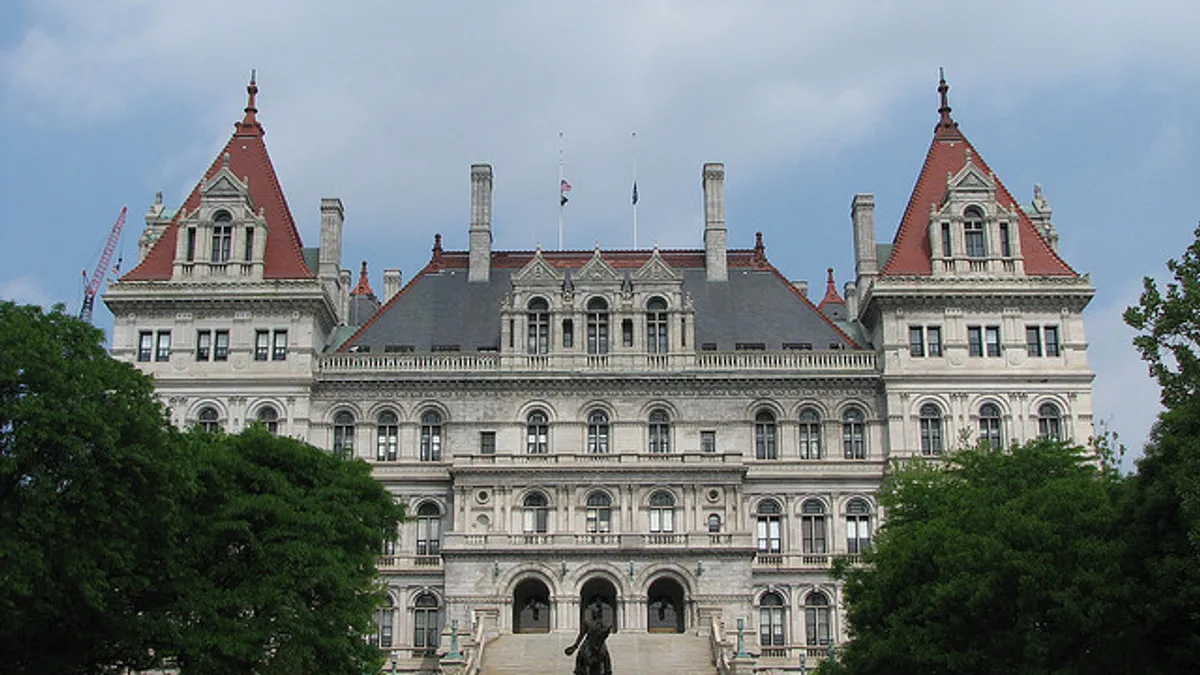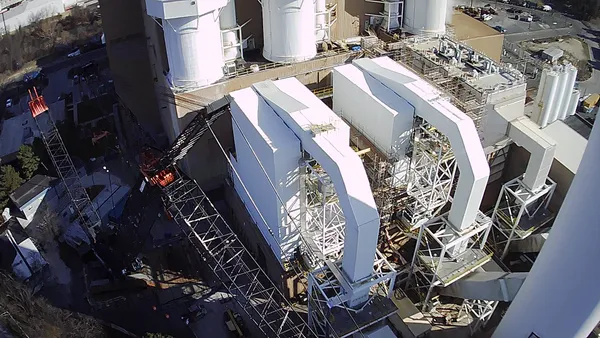UPDATE: May 28, 2019: New York Gov. Andrew Cuomo signed a bill (A5029A) on May 24 aimed at protecting "the Finger Lakes region from the adverse effects of the siting of newly constructed incineration facilities." The legislation effectively blocks plans for a new $365 million Circular enerG incinerator in the Finger Lakes region.
According to Alan Knauf, an attorney for Circular enerG, the company plans to pursue legal action against the state. "[N]ot only is the law contrary to the State Solid Waste Hierarchy, but we believe it would be an unconstitutional denial of Equal Protection and infringement on interstate commerce," Knauf commented to Finger Lakes Times via email.
Dive Brief:
- The New York Senate has unanimously passed a bill (S2270A), known as the "Finger Lakes Community Preservation Act," designed to effectively block plans for a new incinerator by prohibiting certification under the New York State Environmental Quality Review Act. Following passage of a matching bill (A5029A) in the state Assembly, the decision now rests with Gov. Andrew Cuomo.
- Plans for the estimated $365 million, 2,640 ton-per-day facility from Circular enerG have faced vociferous opposition from local groups. "We urge Governor Cuomo to sign this bill so we can put this outrageous proposal behind us and go back to growing the Finger Lakes economy," Seneca Lake Guardian President Joseph Campbell said in a statement.
- "The bill is a real step back for the environment. It would just encourage landfilling, which is the worst option for waste disposal," said Alan Knauf, an attorney for Circular enerG, via email. "Circular will continue to pursue approval from local authorities, and is awaiting a decision on its Article 78 proceedings challenging rezoning decisions."
Dive Insight:
Similar legislation came close to passing both chambers last year, but fell short when the Assembly didn't bring it to a vote in June prior to the end of its 2018 session. Gov. Cuomo is already on the record opposing the project as of a May 2018 statement, which called it "not consistent" with state public health and environmental goals. He promised to "consider all options" in stopping it from coming to fruition.
Since it was first proposed for the town of Romulus in 2017, the Circular enerG project has become a lightning rod for a variety of larger issues playing out in upstate New York and the U.S. at large. Pitched as a way to develop the former Seneca Army Depot parcel and provide more revenue to local governments, the project has since taken on a different reputation.
The Finger Lakes region, which prefers to be known for its wineries and nature tourism, is already home to some of the largest landfills in the area. Many of these sites have historically accepted large volumes of waste from New York City as well as other Northeast states — a fact that has made area residents and politicians resistant to the idea of any new waste infrastructure, even though Circular enerG has pitched its plan as a way to reduce landfill dependency.
This argument continued in the company's latest statement: "Landfilling causes far greater greenhouse gas emissions from methane, terrible odors, and dioxin emissions from uncontrolled burning of plastics. Recycling is a sham today, with plastics we thought were being recycled ending up in the middle of the Pacific Ocean."
While this line of reasoning may be more widely accepted in other parts of the world, landfills remain a dominant feature of U.S. waste infrastructure, and activism against new incinerators has become more well-organized in recent years. Efforts are underway to exclude the facilities from receiving renewable energy subsidies in multiple states, including New York, and financing is largely focused on international projects at this point.
Given these headwinds, the Circular enerG project was always going to be a challenging one. Asked whether the company still sees a path forward, Knauf cited an ongoing lawsuit over a zoning decision by Romulus as the main focus, but also recognized that if enacted, the new state law might override those efforts.















